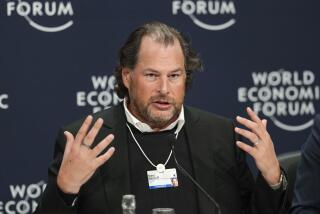Biogen Trading Preceded Warning
Top Biogen Idec Inc. insiders sold $15 million in company shares at near-record prices in the days and even hours before Biogen warned regulators about patientsâ becoming ill in clinical trials of its multiple sclerosis drug, records show.
The drug, Tysabri, was pulled from the market Monday after a patientâs death, causing shares in the Cambridge, Mass., company to plummet 43%.
Biogen told the Food and Drug Administration on Feb. 18 that at least one and possibly two patients in trials for the drug had contracted a rare virus. That day, Biogen general counsel Thomas Bucknum sold 89,700 shares for $6 million, reaping a $1.9-million profit, according to Securities and Exchange Commission filings. He had purchased the shares the same day by exercising stock options.
Biogen spokesman Jose Juves said Tuesday that Bucknumâs stock sale was planned and executed before he became aware of the illnesses or fatality. Juves said sales by three other Biogen insiders Feb. 14 and Feb. 15 were part of automatic share divestiture programs and also unrelated to the problems with Tysabri.
âAt the time, no senior executives had any knowledge behind what would eventually be the suspension of Tysabri,â Juves said.
Juves said the company moved quickly to investigate the episode once it became aware of the rare virus, noting that a sickness in a clinical trial may not necessarily be related to the drug. One of the two patients who became ill died Thursday.
Securities laws bar executives from trading shares when they are in possession of significant nonpublic information.
The sales by Biogen executives will probably prompt an inquiry from the SEC, said Tom Taulli, adjunct professor at USCâs Marshall School of Business and president of a Newport Beach securities research firm.
âIt doesnât look good,â Taulli said. âIf I were the SEC and saw an order that was put in that same day, Iâd be looking into it.â
SEC spokesman John Heine declined to comment. The SEC doesnât discuss nonpublic information, including whether the agency has initiated investigations.
In addition to Bucknum, SEC filings show that Biogen Chairman William Rastetter sold 120,313 shares on Feb. 15 for a profit of $7.7 million.
A day earlier, director Robert Pangia sold 15,750 shares, earning a profit of $951,657, and Executive Vice President Craig Eric Schneier sold 3,500 shares at a $102,024 profit.
Securities filings show no insider transactions after Feb. 18.
On Feb. 17, Biogenâs board of directors granted 10 executives bonuses of nearly $4.6 million. Those bonuses were based on last yearâs performance, said Juves, and were granted as part of the boardâs regularly scheduled meeting to address compensation structure.
The same 10 executives also received new stock option grants that day, giving them the right to buy hundreds of thousands of company shares over the next decade at the Feb. 17 closing price of $67.57 a share.
Those options have been rendered worthless, at least for now, by the stockâs freefall. Biogen ended Tuesday at $41.26, up $2.61 on Nasdaq, but down from $67.28 on Friday and a 52-week high of $67.92 on Dec. 29.
Biogen had been one of the stock marketâs top performers over the last decade. Its multiple sclerosis drug had won expedited FDA approval in November, based on preliminary results of the drugâs clinical trials.
But Biogen and Ireland-based Elan Corp., a partner in developing Tysabri, said that shortly after reporting encouraging results from the drugâs clinical trials Feb. 17, they learned that two of the 500 patients in the trial had developed a rare disorder of the central nervous system.
They contacted the FDA and the drugâs sales were suspended 10 days later.
More to Read
Inside the business of entertainment
The Wide Shot brings you news, analysis and insights on everything from streaming wars to production â and what it all means for the future.
You may occasionally receive promotional content from the Los Angeles Times.










